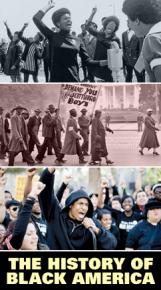Leon Trotsky and the Black struggle
Revolutionaries need to see the central importance of struggles against oppression.
IN THE 1930s, revolutionary socialists in the U.S. who opposed the Stalinized turns of the Communist Party (CP) were marginalized. By 1938, the American followers of the Russian revolutionary Leon Trotsky--Stalin's chief opponent--numbered only a few hundred, much smaller than the CP.
Trotsky, who had been living in exile since the beginning of the decade, driven out of Russia by the ruling Stalinist bureaucracy, recognized that organizing Blacks would be crucial to his American comrades' struggle to emerge from isolation--and that meant competing with the CP. Under the direction of Stalin 's Communist International, the CP had since 1929 called for "self-determination for the Black Belt"--the string of counties in the American South which, according to the Comintern, constituted a Black nation.
In his 1933 discussion with his American comrades on the "Black Belt Question," Trotsky restated the Bolshevik position on national liberation: "We, of course, do not obligate Blacks to become a nation: whether they are is a question of their consciousness. That is, what they desire and what they strive for. We say: if the Blacks want that (self-determination), then we must fight against imperialism to the last drop of blood, so that they have the right wherever and however they please to separate a piece of land."
The made-in-Moscow "Black Belt" theory bore no relation to actual struggles in the U.S. But Trotsky understood why American Black movements, such as Marcus Garvey's "Back to Africa" campaign, had a genuinely nationalist character. Given the incredible racism in U.S. society, the AFL's "Jim Crow" unionism and the racism of the old Socialist Party, Blacks' civil rights struggles would inevitably take place outside the organized labor and socialist movements.
Much of the left refused to acknowledge the special oppression faced by Blacks, arguing that racism would be overcome through building unions and other working class organizations--and that no specific agitation against racism would be needed. Thus, many American socialists viewed community-based Black struggles for political rights as distractions from the class struggle.
Arne Swabeck, a leader of the Trotskyist Communist League of America (CLA), followed this logic. He argued to Trotsky that CLA support for Black self-determination would create barriers to racial unity among workers and lead to uncritical support for the middle-class Black preachers who often led civil rights struggles.
One of Socialist Worker's earliest features was a monthly series on the history of the African American struggle in the U.S., from slavery to the present day.The History of Black America
Trotsky vehemently rejected this position:
An abstract criterion [of nationality] is not decisive in this question; far more decisive is the historical consciousness of the group, their feelings, their impulses. But that too is not determined accidentally, but rather by the situation and all attendant circumstances. The question of religion has absolutely nothing to do with this question of nationhood. The baptism of Blacks is something entirely different from Rockefeller's baptism. These are two different religions. The political argument for rejecting the demand for self-determination is doctrinairism.
Swabeck's opposition to the slogan of self-determination reflected the CLA's abstentionism toward, and ignorance of, Black struggles. Swabeck did not even know whether Southern Blacks spoke their own separate language!
TROTSKY ARGUED that the CLA's indifference to the Black question was a grave problem, much more important than the argument over whether or not to support the CP's self-determination slogan:
Blacks have not yet awakened, and they are not yet united with the white workers. Ninety-nine-point-nine percent of the American workers are chauvinists (racists): in relation to Blacks, they are hangmen as they are toward the Chinese, etc. It is necessary to make them understand that the American state is not their state. Those American workers who say, "Blacks should separate if they so desire and we will defend them against our American police"--those are the revolutionists. I have confidence in them. The argument that the slogan for self-determination leads away from the class point of view is an adaptation to the ideology of white workers.
Trotsky developed his position on national liberation based on the experience of the Bolshevik revolution. The Bolsheviks realized that working class unity across racial and class lines can be created only if workers in the oppressor nations--or race--recognized the legitimacy of the struggles of the oppressed by unconditionally supporting their right to self-determination.
But more than that, Trotsky agreed with Lenin that, while the struggles of oppressed nationalities and nations are incapable of overthrowing capitalism on their own, they nevertheless have an enormous impact on the struggle for socialism.
In 1938, Trotsky met with the Black West Indian Marxist C.L.R. James to discuss the issue. Their conclusions and program will be the subject of the next column in this series.
First published in the February 1986 issue of Socialist Worker.



